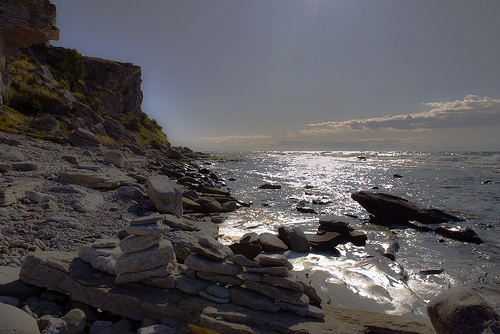
Editor’s Note:
In October I had the pleasure of hearing the young Polish poet Tadeusz Dąbrowski read his poems in a bilingual performance at Atomic Books in Maryland, a stop on his recent tour of the United States. TC readers will no doubt join me in appreciation of his poems, which are simultaneously deeply moving and surprisingly comic. Hopefully you will also relish my aggressive effort to deliver his work to you. As soon as the reading was done I pursued him to the sidewalk, where I procured a promise that he would send us poems to publish. His word’s as good as his work: we’re offering four of his poems here, and three more will follow in the print issue.
Dabrowski is only thirty-four but has already published eight books of poetry; the list of his prizes is longer than the ingredients for plum pudding. His work has been translated around the world—into twenty languages—and his readership continues to grow. Another German collection is due out very soon, and Antonia Lloyd-Jones’ second volume of English translations is well underway—these poems come from that. He’s drawn high praise from Adam Zagajewski in his homeland, and in the US his Anglophone debut, Black Square, was hailed by Timothy Donnelly as a “brilliant, unforgettable book.” We welcome his work to our pages with sincere excitement.
John Hennessy, poetry editor
Sweden (translated from the Polish by Antonia Lloyd-Jones)
No barriers at all on top of a sheer cliff,
I must do my own deal with the cliff on where our
borders lie. The promenade is divided from the sea at night
by small halogen lights walled into the concrete.
At the Systembolaget stores you’re protected from addiction
by astronomical prices and your own common sense.
On one side the brothel has a piece of garden, where families
are sitting with little children, and if you have the desire
for something more, you must go in deeper, through the revolving
door of air. I’m speeding on a bike along
the nocturnal embankment, passing enamored
old people, a woman who is rocking a pram
with her pregnant belly, I ride into all the
reflectors and think about the power of man
after nihilism, or about a halogen conscience.
Or else about air.
Winter Light (translated from the Polish by Antonia Lloyd-Jones)
After your death I became stronger,
I can walk on water, on afterglow-heated
ice, and even drown in mojito sorbet
in a café on Fårö (where I asked for paper
and a pen, to scratch these few inessential words,
and was given a whole snow-white notepad).
City (translated from the Polish by Antonia Lloyd-Jones)
These women will never
change partners again,
pallid and very
much suited to me,
letting themselves go with their eyes
and hurrying somewhere,
I would like to save them,
but they don’t want that at all.
Musicians in position
within the range of sound.
Beggars in position
within the range of sympathy.
Poets in position
within the range of the word.
Drug addicts stuck fast
to the walls of churches,
as humbly as insects
and always on the outside.
You could enlarge the space,
drown yourself in the city,
but no. I come out,
illuminated moths
are crashing into me.
(1998)
A Priest from Kalmar… (translated from the Polish by Antonia Lloyd-Jones)
A priest from Kalmar publicly admitted he does not believe
(Tomas the pastor in the movie Winter Light
only confessed it to Märta), and handed himself over
to the people. A true confession. The bishop dismissed him
from his post. But the believers saw that he was good,
and wanted him back again. They sent epistles about it
to the bishop and the media. And the bishop reinstated
him once more. Now they’re forming a community of non-
believers in Christ. They’re like the holes left by nails.
Like an empty grave.
Tadeusz Dąbrowski is a poet, essayist, and critic. He has been published in many journals in Poland and abroad, and is the winner of numerous awards, including the Kościelski Prize (2009), the Hubert Burda Prize (2008) and the Prize of the Foundation for Polish Culture (2006). His work has been translated into 20 languages.
Antonia Lloyd-Jones is a full-time translator of Polish literature, and twice winner of the Found in Translation award. She is a mentor for the British Centre for Literary Translation’s mentorship program.
Photo by Flickr Creative Commons user Berit Watkin




